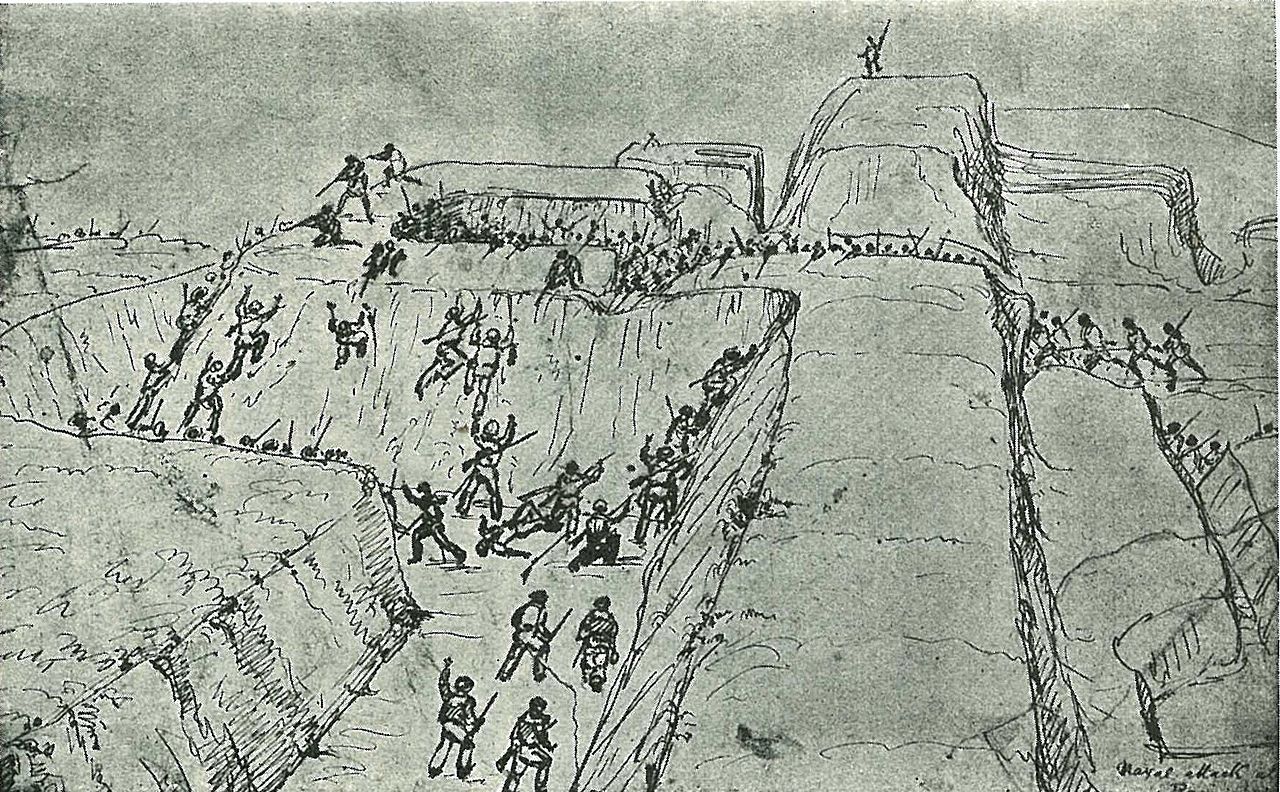Nebakenezzer posted:Malaria, literally 'bad air'. Some sort of gas that comes out of swamps at night? I dunno, I just know people get malaria when near/in these places If I remember correctly, Europeans began encountering malaria most often in their most profitable colonies because they were typically agricultural ones. And of course, areas of Asia and Africa well-suited to agriculture are also well-suited to the breeding of mosquitoes.
|
|
|
|
|

|
| # ? May 27, 2024 08:30 |
|
Nebakenezzer posted:Malaria, literally 'bad air'. Some sort of gas that comes out of swamps at night? I dunno, I just know people get malaria when near/in these places see also early modern surgery. they were actually not bad at it! you could totally cure a dude's head wound with trepanation! which i learned about in the same book where the physician of henry II describes the head injury that killed him:  look at this. except for the lack of cat scans or mri, it could have been written yesterday chitoryu12 posted:If I remember correctly, Europeans began encountering malaria most often in their most profitable colonies because they were typically agricultural ones. And of course, areas of Asia and Africa well-suited to agriculture are also well-suited to the breeding of mosquitoes.
|
|
|
|
chitoryu12 posted:The US is a complete outlier in World War II by being a major part of the conflict and almost totally free of threat. Outside of Pearl Harbor (which I should remind everyone wasn't actually part of an American state until 1959, so it was hardly striking the homeland like blowing up a California naval base would have been), the US never saw anything more than a few saboteur operations that were mostly complete failures. You forget the japanese air balloon bombings, although of course these were also not effective. the JJ posted:Sooooo... War = only relevant measure of progress. Keldoclock fucked around with this message at 19:43 on Dec 3, 2015 |
|
|
|
the JJ posted:I think that's definitely a simplistic look. 'War,' like any other human endeavor, is connected to all the other human endeavors. Could you please explain your position? To summarize a bunch of past posts, the original question was why Europe, at one point equal or behind other countries, was able to pull ahead and impose imperialism and colonialism on other countries. My reply was that the scientific and industrial revolutions greatly pushed forward Europe's ability to wage war, while other countries experienced no great change in this ability. Can you give examples of what changes you see affecting this ability? Or do you disagree that Europe's growth in power was related to military capabilities? Or maybe you have an alternative theory for why European countries came to dominate the world?
|
|
|
|
invading Alaska is more than a saboteur operation even if it was just as ineffective as one
|
|
|
Keldoclock posted:You forget the japanese air balloon bombings, although of course these were also not effective. As far as I know, pretty much zero of the attempted attacks on American soil (Pearl Harbor notwithstanding) were successful in any sense of the term. Even the second Japanese attempt to attack American-owned territory (the Aleutian invasion) was totally pointless in the end; only one proper battle between Allies and Axis was ever fought (with the Japanese force on Attu completely wiped out), and the Americans and Canadians accidentally shot each other on Kiska when they came upon the island and realized that the Japanese just abandoned everything before they got there.
|
|
|
|
|
Agean90 posted:invading Alaska is more than a saboteur operation even if it was just as ineffective as one
|
|
|
|
Keldoclock posted:
|
|
|
|
BurningStone posted:I'm going to disagree with you, only because of the context we're discussing. They were more or less static in their war capabilities, so they were falling behind Europe. That's really all that mattered when the Europeans show up, make demands, and start running out the cannon. I wouldn't dispute that, I mean it's not hard to show that the Japanese military was no match for those of Europe by 1850. I just felt the context of the conversation was veering beyond military history towards vague and outdated Oriental cultural analysis. Firearms changed little in Japan during the Edo Period (why would they?) but many people make the mistake of assuming the same applies to all technology in Japan. One of the reasons Japan was able to modernize so quickly is that they already understood many of the scientific advances going on in Europe at the time, they just hadn't realized their practical applications. I wanted to point out that there were profound societal transformations in many parts of Asia throughout the modern period. The Mughals for example evolved out of existence in the 18th century. It doesn't make sense to call their society static, even if the changes didn't necessarily make them more competitive with European powers.
|
|
|
|
BurningStone posted:Could you please explain your position? To summarize a bunch of past posts, the original question was why Europe, at one point equal or behind other countries, was able to pull ahead and impose imperialism and colonialism on other countries. My reply was that the scientific and industrial revolutions greatly pushed forward Europe's ability to wage war, while other countries experienced no great change in this ability. Can you give examples of what changes you see affecting this ability? Or do you disagree that Europe's growth in power was related to military capabilities? Or maybe you have an alternative theory for why European countries came to dominate the world? My position is that you're looking at a whole continent (the largest, in fact) over a 500 year period and going 'yup, pretty much static.' Now there's been plenty of debate in this thread about all sorts of dynamism across huge swaths of the area you're lumping together. My position is that you should take, like, half a second to... google "history of x," wherein x is any particular region in the world and just start reading. If it says 'yeah, basically nothing happened,' we can come back and talk about this.
|
|
|
|
Squalid posted:I wouldn't dispute that, I mean it's not hard to show that the Japanese military was no match for those of Europe by 1850. I just felt the context of the conversation was veering beyond military history towards vague and outdated Oriental cultural analysis. Firearms changed little in Japan during the Edo Period (why would they?) but many people make the mistake of assuming the same applies to all technology in Japan. One of the reasons Japan was able to modernize so quickly is that they already understood many of the scientific advances going on in Europe at the time, they just hadn't realized their practical applications. Fair enough. As an aside, I find Japan an interesting case, because they purposely picked a target for their country, drove for it, and pretty much achieved what they hoped. the JJ posted:My position is that you're looking at a whole continent (the largest, in fact) over a 500 year period and going 'yup, pretty much static.' Now there's been plenty of debate in this thread about all sorts of dynamism across huge swaths of the area you're lumping together. My position is that you should take, like, half a second to... google "history of x," wherein x is any particular region in the world and just start reading. If it says 'yeah, basically nothing happened,' we can come back and talk about this. I think I've made it abundantly clear that I didn't make the claim you're arguing against. If you want to discuss the process of Europe gaining military domination, go ahead, but please drop the straw man and ad hominem attacks.
|
|
|
|
I do think there is something in European developments in siege warfare and fortifications which made to easier to project power overseas, but then you just ask yourself why European siege tech outstripped say, Indian.
|
|
|
|
|
nothing to seehere posted:I do think there is something in European developments in siege warfare and fortifications which made to easier to project power overseas, but then you just ask yourself why European siege tech outstripped say, Indian. 200 years of dealing with cannon
|
|
|
|
chitoryu12 posted:As far as I know, pretty much zero of the attempted attacks on American soil (Pearl Harbor notwithstanding) were successful in any sense of the term. The submarine I-25 also launched Japanese pilot Nobuo Fujita on September 9, 1942, piloting a seaplane loaded with incendiary bombs, with the goal of setting alight the forests near Mt. Emily in Oregon. I guess you could count that as a saboteur action, but it's pretty brazen. In my eyes causing a wildfire is little different from bombing a city. Similarily, the balloon bombings I mentioned were not wholly ineffective: quote:Here is the tragic tale of the only deaths due to enemy action on mainland America during World War II. The events unfolded on May 5, 1945 as a pastor and his wife took five children for a picnic on a beautiful spring day east of Bly. As Reverend Archie Mitchell parked the car, he heard his pregnant wife, Elsye, call out: "Look what I found, dear." One of the children tried to remove the balloon from a tree and triggered the bomb. The force of the blast immediately filled the air with dust, pine needles, twigs, branches, and dead logs. The mangled bodies of Elsye and the children were strewn around a crater that was three feet wide and one foot deep. Elsye lived briefly but most of the children died instantly.  And here's a lovely photo of the memorial:  While Japanese attacks on the U.S. mainland were surely inconsequential, it is an error to say they are nonexistent. HEY GAL posted:is it important? yeah. is it the measure of a nation? of course not. all it measures is how good a country is at war, not what its philosophy, art, culture, quality of life, or economic strengths are. 19th century prussia probably blew to live in, while early 20th century austria was an interesting place with lots going on I'm sorry, I must have been unclear- I meant measure as in the verb, not the noun. I.e. "a measurement" not "The Measure" or "The Worth". Although, if a nation is in an existential war, than military strength is also "The Measure" of that nation. Obviously I am not suggesting that military strength is the only important characteristic of a nation, I had assumed this fact was plain to everyone in the discussion and so did not merit mention. However I was suggesting that, in a place full of persons with an interest in military history, it would of course be the most prominent and heavily-discussed facet. I thought this fact to also be obvious but the JJ's post suggested otherwise. Keldoclock fucked around with this message at 21:42 on Dec 3, 2015 |
|
|
|
BurningStone posted:Fair enough. As an aside, I find Japan an interesting case, because they purposely picked a target for their country, drove for it, and pretty much achieved what they hoped. Okay, well you were quoting someone looking at 500 years and you generalized to 'Asia' and 'more or less static' so bound your argument (geographically and periodically) and then answer the question of how you delineate military vs. not military, because that's the other point brought up, and you just kinda went 'nuhuh.' If you're not going to demark your claim from 'all of Asia' and '500 years'* I don't need to point to anything aside from wikipedia, and your (I've argued flawed) distinction between military and not is rather irrelevant. Even if we buy that distinction, I don't see a reasonable definition of 'static' which is going to cover. nothing to seehere posted:I do think there is something in European developments in siege warfare and fortifications which made to easier to project power overseas, but then you just ask yourself why European siege tech outstripped say, Indian. https://en.wikipedia.org/wiki/Jaisalmer_Fort https://en.wikipedia.org/wiki/Battle_of_Ohaeawai Etc. etc. *Relative to all of 'the West' is also problematic but we can get to that later.
|
|
|
|
Keldoclock posted:I'm sorry, I must have been unclear- I meant measure as in the verb, not the noun. I.e. "a measurement" not "The Measure" or "The Worth". Although, if a nation is in an existential war, than military strength is also "The Measure" of that nation.
|
|
|
|
i clicked through to the entry on pa and the maori developed modern fortification on their own, only way faster than we did. cooooooool edit: although with the heavy earth parts of the traditional pa, they were already halfway there to begin with
|
|
|
|
I really like that a number of these weren't put up anywhere strategic, just near enough British positions that their existence would annoy the local commanders into marching out and showing those up jumped natives what for. Then once they were out of gunpoweder/it looked like the British might actually have massed enough forces to take the place they'd bail and let the British declare victory over an otherwise useless hill. e: 
the JJ fucked around with this message at 22:06 on Dec 3, 2015 |
|
|
|
Look at that, a well constructed scarp and counterscarp. these guys are loving smart as hell (there's pretentious technical terms for every part of the fortress)
|
|
|
|
gently caress those guys, cuvette is something you eat
|
|
|
|
HEY GAL posted:there are a lot of things that are more important than life Yes, but when someone is trying to kill you and you believe you are acting justly, I assure you your military strength is perhaps the foremost concern in your mind. Indeed as history shows, full mobilization basically throws everything else (art, public works projects, civil rights, luxury), right out the window. Total Defenestration. Plus, there are plenty of utilitarians who will argue that it is indeed better to act unjustly than to die. Kantian ethics aren't universally appealing. In any case, I think we can agree that people will continue to perpetuate unjust acts, and it is better that they live than they die, even if they have acted unjustly, if only because we need more production to safeguard humanity against future problems. Tias posted:gently caress those guys, cuvette is something you eat 
Keldoclock fucked around with this message at 22:21 on Dec 3, 2015 |
|
|
|
Keldoclock posted:You forget the japanese air balloon bombings, although of course these were also not effective. Dude. You are comparing these to, like, the Blitz. I grew up in Coventry. We still have the bombed out shell of the cathedral the Luftwaffe burned to the ground along with the entire city centre. One of these things is laughably not like the other.
|
|
|
|
feedmegin posted:Dude. You are comparing these to, like, the Blitz. I grew up in Coventry. We still have the bombed out shell of the cathedral the Luftwaffe burned to the ground along with the entire city centre. One of these things is laughably not like the other. I'm not comparing it to the Blitz. I even stated several times that they were ineffectual. Chitoryu said that there were no Japanese attacks on American soil except sabateur actions and Pearl Harbor, and that simply is untrue. I'm not saying that killing 5 people is a significant war victory, or failing to set a wildfire is a great military campaign. I'm just saying that it happened, and has historical significance as the only enemy actions resulting in American casualties on the American mainland in WWII. Chitoryu said even the sabateur actions achieved success by no measure: I say this is untrue, attacking American soil frustrated Americans and wasted their resources, even if the wildfire didn't succeed, Oregon's guards had to increase their efforts and this detracted from efforts elsewhere. Likewise, if you build a bomb with the intention of killing Americans, and you kill some Americans, you have at least technically succeeded, even if your results have fallen short thousandfold of your mark. spectralent posted:and also because nazis were loving monsters. If they fought, then they must have thought they could win. If they won, we'd be congratulating them on their military strategy (and, possibly condemning them for cruelty, but I mean, come on, this is war. Unfortunately of course many of these cruel weapons[bombing civilians, biological and chemical weapons] are less effective than the conventional kind so it's doubly regrettable that they were used). Keldoclock fucked around with this message at 22:33 on Dec 3, 2015 |
|
|
|
HEY GAL posted:nah, regions in italy are loving rife with it. thomas aquinas died of that, i think To the extent that southern europe has endemic congenital blood diseases (beta thalassaemia) that're preventative of malaria much like sickle cell is in africa! Also, relevant to war, it was deliberately reintroduced by the nazis to slow down the allied advance through italy, and also because nazis were loving monsters.
|
|
|
|
xthetenth posted:Congrats on being wronger than Keldoclock ever has. E: feedmegin posted:Pre-socialist Russia and China: known for being fantastically rich and well developed. T___A fucked around with this message at 22:44 on Dec 3, 2015 |
|
|
|
spectralent posted:Also, relevant to war, it was deliberately reintroduced by the nazis to slow down the allied advance through italy, and also because nazis were loving monsters. Mussolini drained the pontine marshes, Rome's famous mosquito nursery in the '30s, but all the dikes and dams he built were destroyed in the battle of Anzio. Did the Germans really reintroduce malarial mosquitoes, or did the mosquito population just explode during the rebuild? BurningStone posted:Could you please explain your position? To summarize a bunch of past posts, the original question was why Europe, at one point equal or behind other countries, was able to pull ahead and impose imperialism and colonialism on other countries. My reply was that the scientific and industrial revolutions greatly pushed forward Europe's ability to wage war, while other countries experienced no great change in this ability. Can you give examples of what changes you see affecting this ability? Or do you disagree that Europe's growth in power was related to military capabilities? Or maybe you have an alternative theory for why European countries came to dominate the world? It seems as if that would be attributing European political dominance to the Industrial and Scientific revolution, rather than an unexplained increase in military prowess. Why those happened, well it's a difficult question...
|
|
|
|
The marshes were deliberately reflooded the year prior to Anzio with saltwater for the purposes of reintroducing malaria and destroying farmland; it was done to reintroduce malaria and make the region more treacherous to cross, and destroy farmland of the population that had "betrayed" them. EDIT: Woah, holy crud, managed to find a paper archive from the period, dating the reflooding to at least Oct 31 1943: http://trove.nla.gov.au/ndp/del/article/17862861 EDIT2: In fact other secondary sources say it had very little effect on military targets and was largely civilian directed  Wait gently caress they were hoarding quinine too. I know this isn't going to surprise anyone but the nazis were loving assholes. Wait gently caress they were hoarding quinine too. I know this isn't going to surprise anyone but the nazis were loving assholes.
spectralent fucked around with this message at 23:28 on Dec 3, 2015 |
|
|
|
T___A posted:I would argue that the Russian Civil War did a lot more material damage to Russia than the GPW did. Its easy to grow from 0 and crops are not particularly high tech. feedmegin fucked around with this message at 23:28 on Dec 3, 2015 |
|
|
|
feedmegin posted:Its easy to grow from 0 and crops are not particularly high tech. Tsarist Russia had enough railroad contracts with French companies that the Kaiser feared Russia could instantly bumrush Germany to death if a war started after 1917.
|
|
|
|
golden bubble posted:Tsarist Russia had enough railroad contracts with French companies that the Kaiser feared Russia could instantly bumrush Germany to death if a war started after 1917. And to this very day, France is supplying Russia with military technology, frightening Germany- for example the thermal sights used in the T90.  
|
|
|
|
We all know Sparta as a military power with little to nothing left of them beyond a reputation. Athens left us all sorts, with culture and art. But if Sparta created a really good military, they could have destroyed Athens. And then Athens would be gone and stop being a source of culture. Being good at war kind of trumps everything else in the short term. Yes your books are nice, but my gun lets me take it from you. In the really long run a "good" (I'm the effective sense, not the moral) culture can subsumed a bad one. But beyond one culture being good at taking over another, you can't really judge them without taking a moral framework to apply to the comparison. Unless there's someone with a degree in cultural studies that knows a way I don't. Athens and Rome provided legal frameworks and legacies. Greek and Latin have seeped into European languages. We quote Romans and spend a long time studying them. That puts them on a better footing than Sparta. I'm saying Sparta here because I can't think of a better example.
|
|
|
|
Hazzard posted:Athens and Rome provided legal frameworks and legacies. Greek and Latin have seeped into European languages. We quote Romans and spend a long time studying them. That puts them on a better footing than Sparta. I'm saying Sparta here because I can't think of a better example. Mind you, Sparta provided legal frameworks and legacies too, it's just that they aren't as widely discussed or adopted today. To say that Sparta was nothing but its military is argumentative reductionism. Hazzard posted:But beyond one culture being good at taking over another, you can't really judge them without taking a moral framework to apply to the comparison. Unless there's someone with a degree in cultural studies that knows a way I don't. I don't have a degree in cultural studies, but what's wrong with HDI, or The Economist Intelligence Unitís where-to-be-born index, or any other similar index? Obviously material factors aren't everything (and I detest that apparently this clarification is necessary) but at least we can measure them objectively.
|
|
|
|
Getting a bit of a bong-smoke socrates vibe from this burningstone guy, a weird mix of keldoclock and the weiß uber alles in der welt way of asking racially-tinged questions with a moving target so the discussion doesn't die easily. Why did Europeans dominate the world (the world popped into existence in about 1400 AD), hey everyone what do you think about how the Union wasn't strongly influenced by abolitionists until like 1863 and the South totally had a chance (radical republicans popped into existence circa 1863 and Sherman never wrote that letter before the war telling his friend that the south was loving doomed), hey thread, do you think Japan really stopped having a chance at winning WWII in 1944? I'm more of a 1943 guy myself but they had a good shot until then but we can talk about it
|
|
|
|
HEY GAL posted:(there's pretentious technical terms for every part of the fortress) To be fair those are not so much pretentious as just fairly descriptive French, the tone is just assumed from that 
|
|
|
|
Sparta didn't write things down, so all of their legacy is in probably very biased second hand accounts. Edit: You know what's a good book about why/how the west dominated the world? This is. The guy actually uses metrics to judge the whole thing. You can debate whether population density and city size are the most important metrics to judge a society's dominance, but it's better than nothing. SlothfulCobra fucked around with this message at 00:58 on Dec 4, 2015 |
|
|
|
By those metrics then China and Japan are pretty strong competitors for Current Best Culture, or are we going to move the hemisphere lines so that China is a western power now?
|
|
|
|
Slim Jim Pickens posted:It seems as if that would be attributing European political dominance to the Industrial and Scientific revolution, rather than an unexplained increase in military prowess. Why those happened, well it's a difficult question... If you're asking me, I think it was mostly luck. A series of inventions and discoveries were able to piggy back off each other. The most important point, it seems, was technology advancing so rapidly that it progressed faster than it could diffuse.
|
|
|
|
Arquinsiel posted:By those metrics then China and Japan are pretty strong competitors for Current Best Culture Japan is 19 on the HDI, that's higher than the U.S., while, bafflingly, China is absent from the 2014 HDI report. Oh yeah, I never posted my response to "Why European colonization and dominance?", my answer is first good successful use of fossil fuel resources, probably. Keldoclock fucked around with this message at 01:10 on Dec 4, 2015 |
|
|
|
Hazzard posted:We all know Sparta as a military power with little to nothing left of them beyond a reputation. Athens left us all sorts, with culture and art. But if Sparta created a really good military, they could have destroyed Athens. And then Athens would be gone and stop being a source of culture. Except the Athenians were by and large racist sexist shitbags and fought the Spartans to a pretty good standstill militarily. So I guess I object to the metaphor going both ways. I don't think lasting impact of culture is any particularly good marker. The Athenians wrote, the Spartans didn't; but what persists of what was written has mostly been determined by what wasn't burnt in this or that disaster. I dunno, I think if you want a theoretical framework that hews kinda close to what you're talking about there's Hegel's (actual real Hegel, not Heygal) thesis/antithesis/synthesis poo poo but I'm iffy on that. Also the Athenians were poo poo and democracy was a dirty word well until the 1820s when it became okay in one pissant backward. Even then, we're still all up in that republican poo poo. Additionally, how do you measure 'impact?' By the logic of the Niall Ferguson types, In the same fuzzy way Athenian culture is 'good' Confucius has more people who 'think about' and 'have framework' from him. But is that a inate function of Confucianism or a fact that exists due to population growth? I mean, if you wanna do a Nietzschian genealogy for the purposes of examining your own biases, have at it. I think questioning from whence we've recieved our assumptions and biases is super fun. That's what I've been doing all day. But "I remember Plato's name but need prompting before I recall  " isn't a great measure of... anything? At all? " isn't a great measure of... anything? At all?Basically if you want to start applying 'good' or 'bad' values to what are more or less Darwinian selective processes, um, you're wrong. Also Darwinian tends to point towards a diversification of niches and co-existence of 'winners.' (e.g. any one bacterium is 'winning' evolution to the exact same extent I am, no more, no less, in that it persists in existing.)
|
|
|
|

|
| # ? May 27, 2024 08:30 |
|
SlothfulCobra posted:Sparta didn't write things down, so all of their legacy is in probably very biased second hand accounts. Sparta is like the cultural equivalent of some of those honestly celibate religious enclaves in the 19th c. US.
|
|
|






















